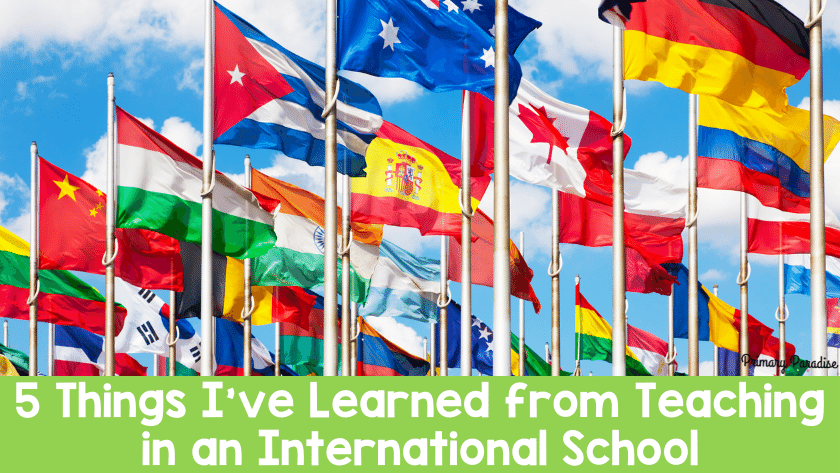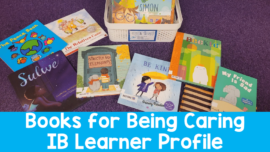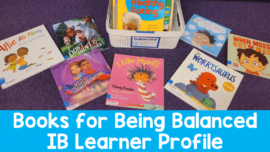Teaching in an international school is a different experience than teaching in a regular, public school in the United States. Here are 5 (sort of random) things that I’ve learned from being an international teacher.
Pronunciation of letter sounds varies greatly by region
One big thing I realized after teaching in an IB international school in Sweden is this. There are a lot of variations on how to pronounce different sounds. As an American who always lived on the east coast of the country, I think I had always been somewhat sheltered when it came to letter sound and word pronunciation. After working in an international school with students from all over the world, both English speaking and non-English speaking countries, I have learned that it really can vary.
One big wake up call was when I began to look at our UK based phonics program: Jolly Phonics. JP is the big English phonics company here in Europe. As I was looking at the picture cues for the different letter sounds, I was… puzzled. “These cues don’t make any sense? How does this help students make this sound?” Of course, many cues made sense to me, but the cues for some of the r controlled vowels did not. For example, the cue for “ar” is a child with a tongue depressor in their mouth, as if at the doctor, for say “ah”. Well, this makes total sense if you’re pronouncing “ar” in the British way as they don’t say that hard r.
Another example is when we had a lively debate about the spelling of the “aw” sound versus the “or” sound such as in “floor” and “flaw”. Again, students who are used to more British English say both of these sounds almost exactly the same way.
Add to this different accents, it’s an interesting experience and I have learned to share both the way I pronounce a sound, and explore the other ways a sound might be pronounced. It certainly makes our phonics lessons interesting!
Multilingualism is a valuable resource and is also very common
I’ve always been so impressed by students who could speak a second language when I taught in the US. Over the years, I had a number of students who were bilingual. Unfortunately, I often noticed some teachers being super frustrated about children who were learning English as their mother tongue was something else. They looked at it as an obstacle instead of an asset. All too often, children who were learning English as a second language were assumed to be struggling learners.
In my current position as a teacher at a international school, I’ve noticed and learned two things. First, multilingualism is not at all unusual in countries other than the US. Most of my students speak at least two languages. In fact, many of them speak 3-4 languages fluently. Of course, much of this is related to the fact that I teach in an international school with students from all over the world, but also our Swedish friends all speak Swedish, English, and often 1-2 more languages.
Secondly, it is such a resource to be able to speak different languages. Sure, it might mean it takes a bit longer to learn English sounds, but that’s because their brain is working hard to make connects in English and their other languages. It gives them a variety of ways to express themselves, and often we can make connections to other languages. And of course, it’s just an amazing life skill to be able to speak in different languages. Now I just need to catch up with my students by improving my own Swedish.
Respect is relative
Although I experienced this some in the US, teaching in an international school has taught me how relative respect can be. Coming from the US, I think we have a pretty set idea of what respect means. But, moving to an international school, this really is in the eye of the beholder. Cultures vary so much, so it’s important to be open, understanding, and flexible. A simple example is that, from my perspective, it’s respectful to look someone in the eye when you’re talking with them. In other cultures, it’s disrespectful to do this.
This is one reason I really love the IB learner profile that we use because it teaches the students, and me, to be open-minded and listen to and learn about and from other people’s perspectives. After all, we are living in a globalized world, so being able to work with and understand other cultures is super important.
Kids are very capable of being open-minded
On the same thought, I have learned just how open-minded children are. Of course, I experienced this in the US, but it’s been so apparent this school year as an international teacher. When my family moved to Sweden, I experienced a lot of culture shock at first. Of course, not all bad, but it was just so overwhelming in those first few weeks. I never realized how set in my ways and how fixed my mindset was in a lot of areas.
On the other end of the spectrum, my students and my own children seem to be so capable to listening to and understanding each other’s thoughts, ideas, and perspectives with guidance. It gives me great hope for the future to see how my students think about and understand each other with open-minded perspectives. It has also showed me how creative and flexible students are when given the right kind of tasks and lessons.
Your students have so much to teach you
Lastly, I have learned so much from my students this year. Of course, my students taught me so much in the US as well. But, in an international school, my students have taught me so much able their cultures, countries, and families. I have learned new words in other languages, new customs and perspectives, and new traditions and celebrations. It has been so lovely to see the world through their eyes and shift my understanding and perspective on many things. Teaching in an international school has been such a valuable and life-changing experience!
Keep reading:
8 Reasons I Love Teaching at My Kid’s School
Help Students Resolve Conflicts
What I do Instead of Guided Reading




